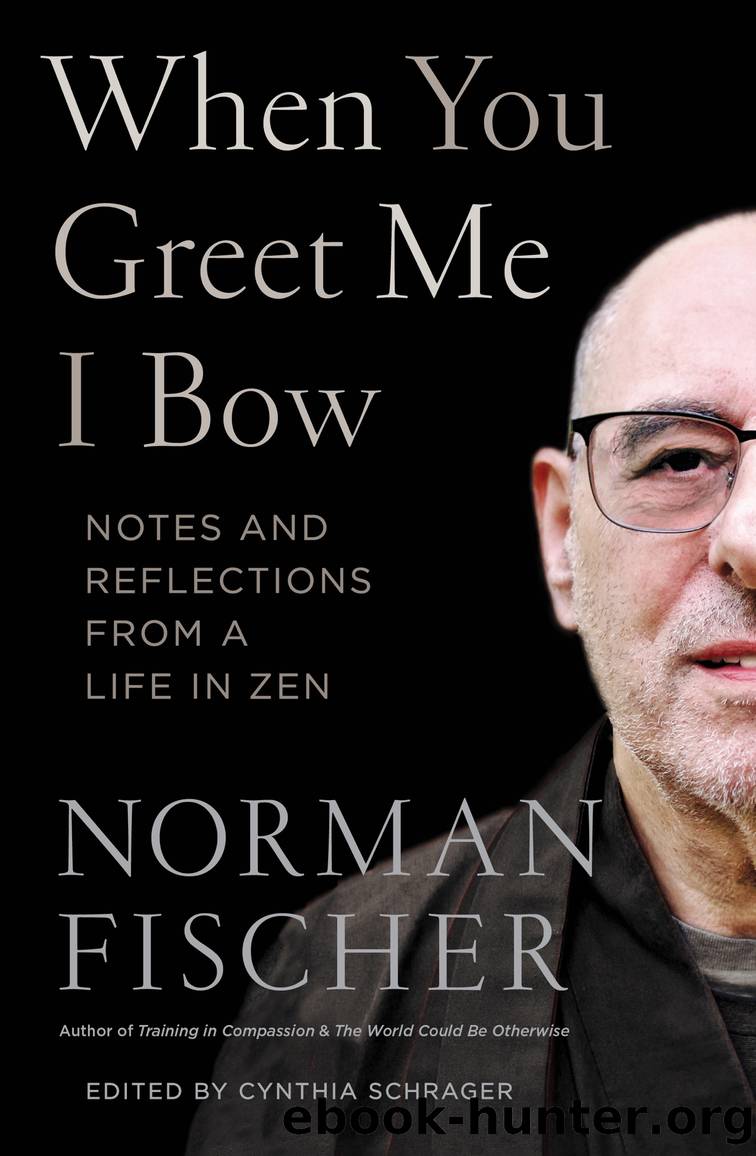When You Greet Me I Bow by Norman Fischer

Author:Norman Fischer [Fischer, Norman]
Language: eng
Format: epub
Publisher: Shambhala
Published: 2021-05-18T00:00:00+00:00
* * *
When I was doing a reading at a bookstore in Vancouver, British Columbia, a young Chinese woman in the audience said that when she was growing up in China she thought of Buddhism as very silly stuff, relevant only to superstitious grandmothers. As far as she knew, Buddhist temples were dusty dark places where people burned paper money to provide economic sustenance for their relatives in heaven. When she emigrated to Canada, and noticed to her surprise that educated and aware white people were practicing Buddhism, she decided to investigate. She discovered something completely different from what she had seen at home: a practical psychological practice that would help you in your life. When I repeated this story some months later at a public dharma talk, I was castigated by a white American woman who told me that I sounded like a cultural imperialist, implying that old Chinese people were stupid and backward, and that only we educated modern Westerners really knew what Buddhism was or was supposed to be.
She had a point! It took Western convert Buddhists of the 1960s only a decade or so to move from unquestioning respect for Asian teachers to an unconsciously arrogant sense that they were casting aside the âcultural baggageâ of Asian Buddhism to find its âtrue essence.â Some of the British and German scholars who first translated Buddhism for the West in the early nineteenth century (and who were representatives of colonizing cultures) proceeded on this assumption from the start. They assumed that the pure and true Buddhism they were finding in the original texts had been corrupted by years of tradition and was only now being refurbishedâby them! According to this way of looking at it, Buddhism (or any religion or philosophy or praxis) is an eternal essence to be extracted from ancient sacred texts, which essence is bound to be corrupted over the centuries by ignorant practitioners.
Contemporary scholars of religion have a very different point of view. They are uncovering the biases of the early scholars, who were studying a Buddhism they did not realize they themselves were constructing. Todayâs scholars say that religion isnât what texts seem to say it is. Texts can be read in many waysâespecially across cultures and languages. Rather, religion is what the people who practice it feel and think, do and believe, as they interpret (or ignore) those texts. Religions donât become corrupted over time, they simply change, for better or worse, according to the uses people need to make of them.
In the early days when we American Zen students were earnestly trying to do things the way the Japanese did, we always failed. No matter how hard we tried, we inevitably did things our own way, because, like anyone, we were products of our conditioning; we simply couldnât escape being who we were. On the one hand, you might say we were botching up our project of trying to understand and practice Zen. On the other, you could say that without
Download
This site does not store any files on its server. We only index and link to content provided by other sites. Please contact the content providers to delete copyright contents if any and email us, we'll remove relevant links or contents immediately.
Spare by Prince Harry The Duke of Sussex(5173)
Machine Learning at Scale with H2O by Gregory Keys | David Whiting(4290)
Never by Ken Follett(3931)
Harry Potter and the Goblet Of Fire by J.K. Rowling(3842)
I Have Something to Say by John Bowe(3494)
Unfinished: A Memoir by Priyanka Chopra Jonas(3371)
Fairy Tale by Stephen King(3366)
Greenlights by Matthew McConaughey(3159)
The Man Who Died Twice by Richard Osman(3066)
Will by Will Smith(2904)
Think Again by Adam Grant(2457)
Rationality by Steven Pinker(2349)
It Starts With Us (It Ends with Us #2) by Colleen Hoover(2333)
Can't Hurt Me: Master Your Mind and Defy the Odds - Clean Edition by David Goggins(2319)
The Dark Hours by Michael Connelly(2299)
The Storyteller by Dave Grohl(2225)
Friends, Lovers, and the Big Terrible Thing by Matthew Perry(2212)
The Becoming by Nora Roberts(2187)
The Dawn of Everything: A New History of Humanity by David Graeber & David Wengrow(2186)
